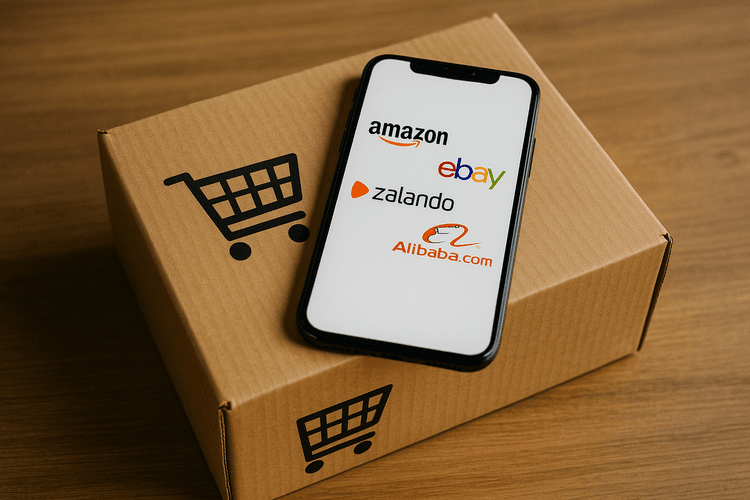
Selling online nowadays is truly something within everyone's reach. It involves various methods and different volumes of business.
The world of online selling is indeed very extensive. Therefore, with this guide, which will still try to be sufficiently comprehensive, we do not expect to cover every aspect.
The big names in online selling

The first thing that comes to mind for anyone talking about selling on the internet is certainly the big names like Ebay or Amazon.
Ebay primarily facilitates connections between individuals (but not only) who sell and buy second-hand products as well. It could almost be described as a site halfway between C2C and B2C.
As for Amazon and other marketplaces, however, we are talking about an almost exclusively B2C sales system. The consumer purchases directly from Amazon.
It is Amazon itself that takes care of shipping the item, which is stored in its warehouses. The same goes for others, such as Aliexpress or Zalando.
Now that we have outlined the most well-known names in global e-commerce, let's start talking about how an individual can sell products on the internet.
How can one sell online?

Let's say a private individual wants to use the internet to sell online.
Is it possible? Of course, yes.
Firstly, it is necessary to understand how and what they want to sell. Here mainly two possibilities open up:
- Selling own products;
- Becoming an affiliate, and using one's website or blog to promote other people's products.
Both are very widespread and functional methods. Let's take a closer look at them.
Selling own products
This is perhaps the most demanding method because it requires building a sort of identity, recognizability, that will identify one's product (whether it be a tangible product, but this also applies to a service that one wishes to provide to the public).
In addition to this, if one wants to sell online, it is necessary to have one's own space: a website or a blog.
In cases of this kind, attention must be dedicated both to the creative process of the product and to the advertising campaigns that make it known, and thus purchased by consumers.
It is therefore advisable, as a first requirement, to have social media profiles corresponding to those of the seller or the blog/site. This will help lay the foundations for what will come later on.
What should come after will surely be well-thought-out marketing campaigns. For social media, it is advisable to start with a display advertising campaign.
The goal is to bring consumers to the site. Once there, then in a way that's anything but intrusive, it would be desirable to manage to obtain their email address, in order to reduce the distance between them and the sale of the product.
All of this falls within a broader process, that of conversion, which in simple terms leads a user to purchase a product, going through various stages (filling out forms, leaving emails, clicking on links, etc.).
In short, the bulk of the work, in cases like these, turns out to be on promoting the product.
Selling products through influencers
An obligatory mention goes to a particular way of making a product known, which in recent years represents a trend with strong growth.
We all know more or less about influencers, i.e., those figures who enjoy enormous visibility and who have a following of thousands, if not millions, of users.
Precisely because of this visibility they have, lately it has been chosen to entrust them with the sponsorship of a product.
This strategy is generally adopted by companies or manufacturers rather than individual private individuals, but what we are interested in illustrating is how this thing works.
Turning to influencers means conveying the product through their image until it reaches their audience.
Generally, fans of this or that influencer tend to have trust. Especially if the influencer in question is not simply a well-known and famous figure, but rather an expert in the field concerned (a trivial example being Clio Make-up with regards to cosmetics).
Selling products as an affiliate
The concept of an affiliate site is a very widespread strategy nowadays.
It is used a lot in all those cases where one owns a website or blog that focuses on some particular topic (for example books, or clothing), and uses it to sponsor non-proprietary products.
Many big brands offer affiliate programs: Amazon, Zalando, Aliexpress, just to name the most famous ones.
Almost all affiliate programs are based on commissions, with various percentages and methods of credit or collection (not too different from each other in reality).
Therefore, for every product that the marketplace sells thanks to the affiliate link from our website, we receive a profit as a percentage of the sale.
Generally, all this does not require an extensive promotional effort like that required by selling one's own products, because it is assumed that our blog or site already has its own target audience.
Hence, they will be the ones who, stimulated and persuaded by our site, will click on the affiliate link that will then take them to the product we are recommending.
Why sell products online?

It is undeniable that today it is an extremely widespread practice, for many reasons.
The main ones are certainly: because it can be done and because it can be done in complete comfort.
Today, this sector has thousands of tools designed to improve websites, to make them seen before others, or software for inventory management, and so on, with myriad other solutions, intended to manage just as many situations.
Selling online today is something essential if you simply want to sell.
Even those who have a physical store can't afford the luxury of not turning to the internet.
Why?
Because the web exponentially increases the customer base and the sales opportunities.
Just think of a small merchant with a tiny boutique or shop in a little village who manages to export their products to the other side of the world. Unthinkable without the internet.
In conclusion, the internet offers an infinity of possibilities and solutions for those wishing to sell online. All that's needed is passion and initiative. Professionalism and experience will be added bit by bit.
Sell online with Framework360
If you're planning to sell online, then Framework360 will be the perfect tool for creating and managing your online business.
Framework360, the Italian platform that is innovative and the most complete for everything related to digital marketing, will give you the possibility to create your own online environment and consequently configure and manage your personal website, in a simple and effective way, without needing any skills in web building or programming.
Once you have created your website, you can also open an e-commerce section and thus create your own independent online sales site. You just need to go to the "customization" section of the platform, and then to "plugins"; here you can find and install the e-commerce plugin with one click, which will allow you to perform all necessary operations and steps for creating a sales site, from product insertion to checkout management.
The platform offers you the ability to configure your site's pages and elements easily thanks to the handy visual builder integrated, and also provides a section for web tracking and reports, essential for viewing data on website performance, crucial to best direct advertising and conversion campaigns.
By creating an independent website, you will thus be unbound from any fees or terms related to third-party marketplaces.
All this and more with Framework360, the perfect and complete tool for those in online business and marketing.
You can do it too, you just need a lot of commitment and an excellent marketing and sales platform.







